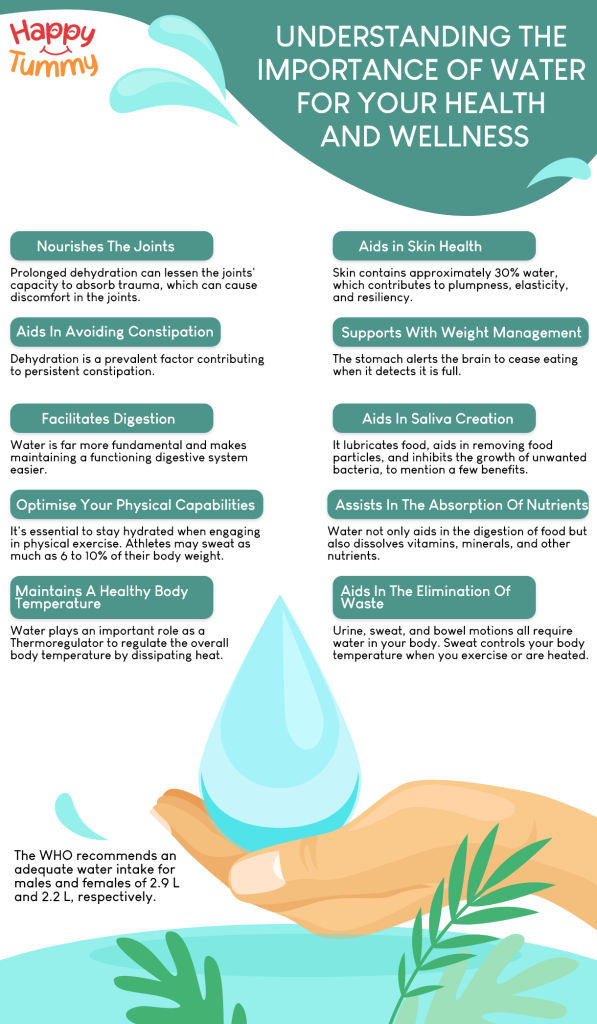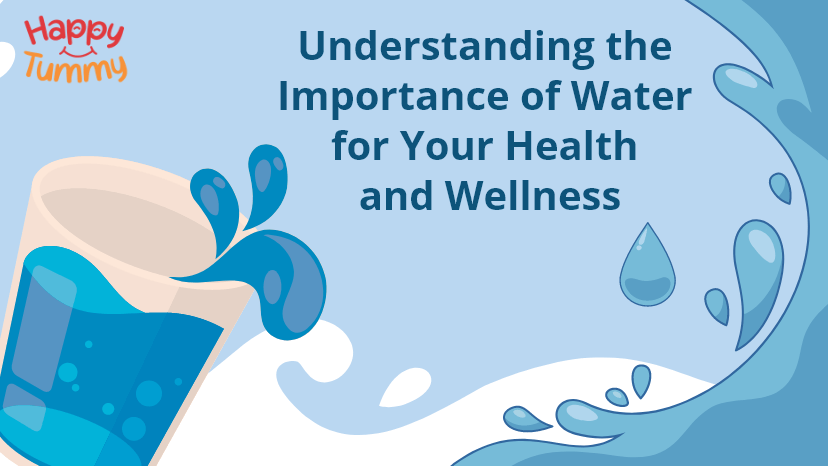Table of Contents
Without water, humans can only survive for 2–4 days, therefore, maintaining adequate moisture is very important. You can fight off hunger, but continuing to thirst is challenging.
Approx. 60% of an adult’s weight is composed of water [1]. It is found in lean muscle, fat, and bones in the form of other body fluids. It is the building block of blood, digestive fluids, urine, and sweat.
Drinking water has almost countless benefits. It is so helpful, so simple, yet it’s also so easily neglected. We require fresh sources of water every day to replenish what is lost through the skin, lungs, urine, and feces.
The quantity we require varies according to our body type, metabolism, temperature, food intake, and exercise routine. In humans, water absorbs vital vitamins and nutrients from meals and transports them to cells, serving as a delivery system.
Additionally, water helps our body eliminate toxins, keep the tissues in our nose, ears, and throat wet, control body temperature, and speed up metabolism. In this blog article, we’ll discuss the advantages of drinking water and explain its recommended daily intake.
Importance of Water
All of the body’s cells and organs require water to function correctly. Our bodies require water for the following reasons:

#1 Nourishes The Joints
The 80% cartilage content (flexible cushion) found in joints and the spine’s discs is water[1]. It acts as a lubricant to smoothly move joints and internal organs in the form of synovial fluid and mucus. Prolonged dehydration can lessen the joints’ capacity to absorb trauma, which can cause discomfort in the joints.
When dehydrated, the body pulls water from cartilage and other areas, decreasing lubrication and causing joint pain. So, drinking water throughout the day is essential to stay ahead of your hydration needs [2].
#2 Aids In Saliva Creation
Saliva, the clear liquid that forms in your mouth, is crucial since it has a variety of functions. It lubricates food, aids in removing food particles, and inhibits the growth of unwanted bacteria, to mention a few benefits.
Lack of water can cause various health-related symptoms in the oral cavity, such as dry mouth, burning in the mouth due to thirst, or low saliva secretion.
Drinking water all day is one of the most excellent strategies for avoiding dry mouth. The body must have adequate fluid to produce saliva. Staying hydrated may be one of the simplest methods for maintaining good dental health and creating more saliva[3].
#3 Maintains A Healthy Body Temperature
It’s essential to drink enough water to keep your body temperature stable. It plays an important role as a Thermoregulator to regulate the overall body temperature by dissipating heat. Sweating occurs during physical exercise and in heated surroundings, which causes your body to lose water.
Your body uses sweat to stay cool, but your body temperature shall not be optimally maintained if you don’t replace the water you lose via sweat. This is because dehydration causes your body to lose plasma and electrolytes[4].
Thus, Drink lots of water if you’re sweating more than usual to prevent dehydration. You may also supplement your drinks with additional electrolytes when excessive sweating is experienced.
#4 Aids In The Elimination Of Waste
Urine, sweat, and bowel motions all require water in your body. Sweat controls your body temperature when you exercise or are heated. You need water to replace the fluids lost through sweat.
Also, having healthy stool and preventing constipation depends on having adequate water in your system.
Urinating out waste is another crucial function of your kidneys. Consuming enough water promotes kidney function and may lower the risk of kidney stones [5].
#5 Optimise Your Physical Capabilities
It’s essential to stay hydrated when engaging in physical exercise. Athletes may sweat as much as 6 to 10% of their body weight.
Hydration may have an impact on your endurance, strength, and power as well[6]. If you perform high-intensity activities like basketball or endurance training, you may be more vulnerable to dehydration’s consequences.
So, keep increasing your water intake accordingly to optimise your capabilities as per your routine physical activities.
#6 Aids In Avoiding Constipation
Dehydration and lack of fibre may be a prevalent factor contributing to persistent constipation. Food travels from the stomach to the large intestine or colon. If the body is already deficient in water, the large intestine absorbs it from meal waste and as a result you may experience difficult-to-pass firm stools. It softens stools to facilitate its passage[7].
#7 Facilitates Digestion
Water is far more fundamental and makes maintaining a functioning digestive system easier. Almost every stage of the digestive process involves water, another reason why maintaining enough hydration is vital to good health.
Drinking water aids in the breakdown of meals by your digestive juices, allowing the body to absorb the nutrients and excrete the remaining. Saliva contains digestive enzymes that aid in digestion by dissolving minerals and other nutrients and breaking down food and drink.
Proper digestion makes minerals and nutrients more accessible to the body.
Enough water in the digestive system can soften and facilitate the passage of faeces. Additionally, it may encourage smooth and regular bowel movement through the intestines [8].
#8 Assists In The Absorption Of Nutrients
Water not only aids in the digestion of food but also is vital for cellular metabolism, nutrient transport, and waste elimination.
It serves as a universal solvent; aiding in nutrient digestion, absorption, transport, and metabolism as well.
#9 Supports With Weight Management
The stomach alerts the brain to cease eating when it detects it is full. Water can fill the stomach, causing feelings of fullness and decreasing appetite. In some instances, people mistakenly perceive themselves as hungry when genuinely thirsty.
You may reduce needless snacking by having a glass of water before reaching for something to eat.
A study conducted on consuming water increases weight loss during a hypocaloric diet in middle-aged and older adults, reported that drinking ~2 cups of water before each of the three main daily meals may increase weight loss when combined with a hypocaloric diet, as compared to a hypocaloric diet alone [10].
An increase in drinking water may promote weight loss by altering metabolism and by increasing satiety, thus promoting weight loss.
#10 Aids in Skin Health
Water consumption helps your body eliminate pollutants, particularly toxic substances that might negatively impact your well-being. You may enhance your body’s and skin’s health by drinking more water to help your body eliminate waste products.
It comprises almost all of cell’s components, including skin cells. Skin contains approximately 30% water, which contributes to plumpness, elasticity, and resiliency. Dry skin is characterized by wrinkles and a lack of elasticity.
Hence, water is vital for two reasons: first, it keeps the skin hydrated, and second, it helps in transporting the nutrients that the skin cells need.
Thus Drinking enough water will not only moisturize your skin but may also encourage collagen formation [11] as water is known to surround the collagen structure, and tightly binds to it creating a well-ordered hydrated layer that can control collagen properties.
Amount of Water You Should Drink
The recommended daily water intake varies based on activity level, gender, height, weight, and other factors.
The WHO recommends an adequate water intake for males and females of 2.9 L and 2.2 L, respectively [12]
Consuming water-rich fresh fruits and vegetables also contributes to this daily need. Ask our certified nutritionist for recommendations on guidelines that shall work the best for you.
Tips To Consuming Water-Rich Foods
Almost every area of your body needs water. Reaching your daily target will not only help you maintain your optimum water intake but may also enhance your general well-being.
To make sure you drink enough, consider the following strategies:
- Consuming foods high in water content like cucumber, watermelon etc.
- No matter where you go, always have a water bottle with you. You’ll be able to drink anytime you feel like it.
- Monitor your consumption. Consume the recommended daily allowance, which should be 2.9 L and 2.2 L for males and females, respectively.
- By lunchtime, pace yourself so you’ve consumed nearly half of what is advised. You can always wrap up an hour or so before you want to go to bed. Other ways to keep yourself hydrated along with adequate water intake can be by consuming other beverages like fresh fruit juices, tender coconut water, buttermilk, lassi etc.
Long Story Short
Every living thing requires water to survive. It is their essential requirement. It is nature’s most priceless gift to us and aids in survival. Water is a crucial component of life as it makes up 70% of our body. Every day, water is required for several reasons.
You should drink water before you even realize you need to drink it. Drink water often throughout the day, and modify your consumption according to your lifestyle. During very hot weather and while undertaking vigorous physical activity, this requirement increases as a considerable amount of water is lost through sweat.
Frequently Asked Questions
When people drink a lot of water, they get overhydrated, which can change the body’s levels of electrolytes, including potassium, sodium, and chloride. Overhydration, or consuming too much fluid, may result in headaches, cramps, weakness, nausea, and disorientation.
Water is present in most meals. Solid meals provide the body with around 20% of its water requirements [11]. The percentage of water from food and drink varies depending on the percentage of fruits and vegetables consumed.
You are probably getting enough fluids if:
– You don’t often feel thirsty
– Your urine is either pale yellow or colourless.
The ideal daily water intake for you can be ascertained with the assistance of your physician or nutritionist.















